|
 |
|
Collectable Leica 'M' Series Camera |
|
1) Leica M1
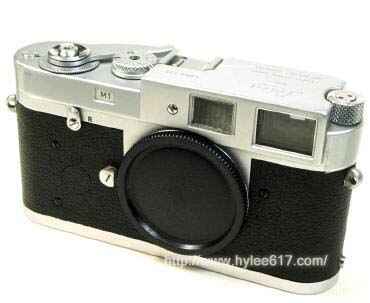
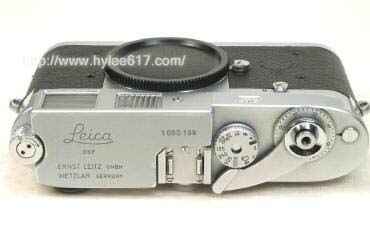
-
The M1 is a simplified version of the M2, especially usefull for scientific applications. It contains no rangefinder for focusing.
-
The M1 was introduced as a camera primarily for use with the Visoflex reflex housing, or on a microscope. It lacked the rangefinder of all previous M models, and had framelines for the 35 and 50 mm lenses only. Early cameras have button rewind, later cameras have lever. All M1's were finished in chrome, except for small batches finished in olive green for the military.
Technical Information
- Number made 950,001 - 1,102,900 (1959-1964)
- Finish chrome
- Lens Bayonet Mount
- Focal plane shutter
- Film Advance Single Stroke Lever
- Rangefinder/Viewfinder Coupled Frames 35,50
- Rangefinder Base Length No Rangefinder
- Viewfinder Magnification .72
- Field Selector Lever
- Shutter Speeds 1,B,1/1000
- Flash Sync, Elec. 1/50, Bulb 1/500
- Exposure Meter No
- Film Speed
- No Self Timer
- Weight 545 Grams
|
Variations/Special Models
- Year: 1960 - 1964
Model: M1 - Military (olive green)
Produced: 208
- Year: N/A
Model: M1-Post (24x27mm format)
Produced: 32
|
|
|
2) Leica M2
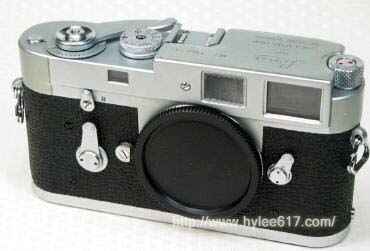
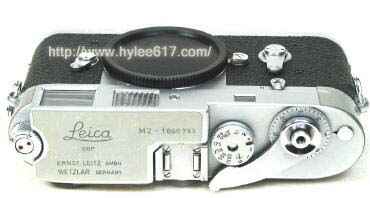
-
The M2 was a camera that appears to have been aimed at users on both ends of the market. It was designed as a less expensive alternative to the M3, initially lacking self timer, although later models included it, and the film counter was external, and had to be manually reset.
-
It also appears they designed the camera for the professional, changing the viewfinder to accommodate the field of view of a 35mm lens, with framelines for 50 and 90mm, a set of framelines better suited for many professionals. The camera also accepts the trigger wind baseplate, and a small batch were fitted with electric motor drives, and are marked M2M in front of the serial number.
-
In 1966 the US Army ordered M2 cameras with the rapid loading system found on the M4. Designated as M2S, these cameras bear no special markings, and any M2 can use an M4 baseplate and have this feature. Civilian versions of the M2S were sold as M2R, which was marked in front of the serial number.
One batch of 20 cameras were finished in gray paint for the German Air Force, but are listed in the statistics as black cameras.
Production started at 926,001, and ended at 1,165,000.
Technical Information
- Number Made 926,001 - 1,207,000 (1957-1968)
- Finish Chrome, Black Paint
- Lens Bayonet Mount
- Shutter Focal Plane
- Film Advance Single Stroke Lever
- Rangefinder/Viewfinder Coupled Frames 35,50,90
- Rangefinder Base Length 49.3mm
- Viewfinder Magnification .72
- Field Selector Lever
- Shutter Speeds 1,B,1/1000
- Flash Sync Elec. 1/50, Bulb 1/500
- No Exposure Meter
- Film Speed
- Self Timer
- The first 500 had no self timer
- Weight 580 Grams
|
Variations/Special Models
- Year: 1959
Model: MP-2 (motor drive)
Produced: 15
- Year: 1960
Model: M2 Military (blue/grey)
Produced: 20
- Year: 1966
Model: M2-M (motor drive)
Produced: 276
- Year: 1966-1968
Model: M2 Military KS15-4
Produced: <900
- Year: 1969
Model: M2-R (rapid film load)
Produced: 2000
|
|
|
3) Leica M4
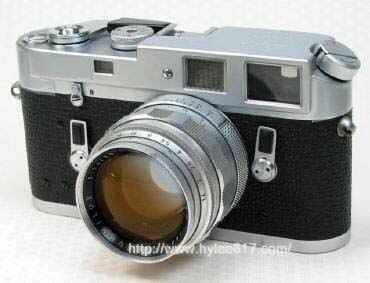
Leica M4 Summilux 50mm F1.4
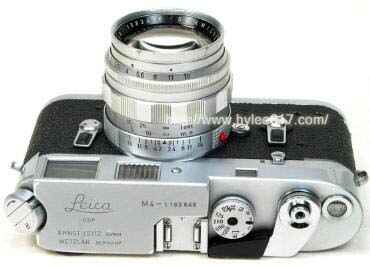
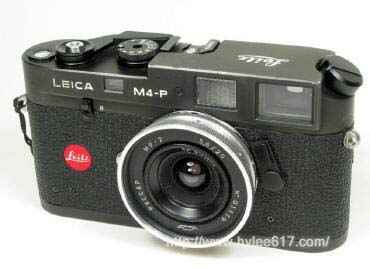
Leica M4-P / Russian Mir 20mm F5.6
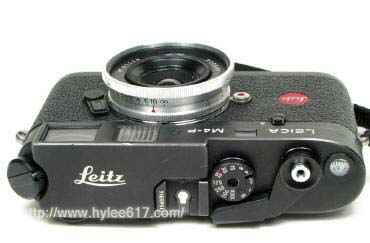
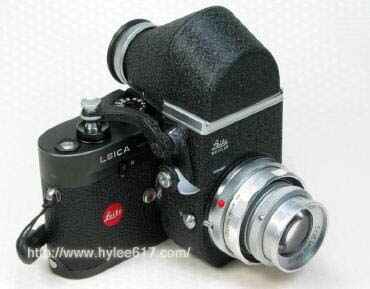
M4-P Visoflex II /Elmar 90mm F4
-
The original Leica M4. With its brass gears, his is one of the smoothest working Leica cameras I have ever used. All other M4-P & M4-2 used steal gears to facilitate use with Leica motors. The smoothness and build quality of the original Leica M4 is legendary. The M4 when used with the 28mm or Tri-Elmar will only bring up framelines for the 135mm. If you use the border of the viewfinder itself, you will have the perfect framelines for the 28mm, making the 28mm or Tri-Elmar lens perfectly useable with the M4.
-
The M4-2 was basically a reintroduction of the M4, after the failure of the M5 in the marketplace. The features are basically the same, except for the lack of self timer. The camera also accepts a power winder, and has a hot shoe for flash.
Most M4-2 cameras were assembled in Canada, although some were marked Wetzlar, and some have both German and Canadian engraving. The very earliest M4-2's have a red Leitz logo on the front.
-
Canadian Models in Chrome and Black Chrome are among the rarest models. Less than 100 Chrome M4 Canadian models were produced. Some original M4's were Painted in Black Enamel. These cameras had brass topplates and less than 4900 were made. The Original M4 had brass gears, many consider the action of this camera as the smoothest version. The later M4-2 & M4-P was designed for use with a motor drive and had steel gears. The M4-2 added a hotshoe but subtracted the self timer. The M4-P was the same as the M4-2 but added additional framelines in the viewfinder for 28mm & 75mm lenses.
M4 Technical Information
- Number made 1,175,001 - 1,443,170 (1967-1975)
- Finish Chrome, Black, Black Paint
- Lens Bayonet Mount
- Shutter Focal Plane
- Film Advance Single Stroke Lever
- Rangefinder/Viewfinder Coupled Frames 35,50,90,135
- Rangefinder Base Length 48.5mm
- Viewfinder Magnification .72
- Field Selector Lever
- Shutter Speeds 1,B,1/1000
- Flash Sync Elec. 1/50, Bulb 1/500
- No Exposure Meter
- Film Speed
- No Self Timer
- Weight 600 Grams
|
M4-2 Technical Information
- Number made 1,468,001 - 1,533,350 (1977-1980)
- Finish Chrome, Black
- Lens Bayonet Mount
- Shutter Focal Plane
- Film Advance Single Stroke Lever
- Rangefinder/Viewfinder Coupled Frames 35,50,90,135
- Rangefinder Base Length 48.5mm
- Viewfinder Magnification .72
- Field Selector Lever
- Shutter Speeds 1,B,1/1000
- Flash Sync 1/60 Hot Shoe Added
- No Exposure Meter
- Film Speed
- No Self Timer
- Weight 525 Grams
|
M4-P Technical Information
- Number made 1,543,351 - 1,692,950 (1980-1986)
- Finish Chrome, Black
- Lens Bayonet Mount
- Shutter Focal Plane
- Film Advance Single Stroke Lever
- Rangefinder/Viewfinder Coupled Frames 28,35,50,75,90,135
- Rangefinder Base Length 48.5mm
- Viewfinder Magnification .72
- Field Selector Lever
- Shutter Speeds 1,B,1/1000
- Flash Sync 1/60 Hot Shoe Added
- No Exposure Meter
- Film Speed
- No Self Timer
- Weight 545 Grams
|
Variations/Special Models
- Year: 1969
Model: M4 Military
Produced: 31
- Year: 1970
Model: M4-Mot
Produced: 12-24 estimated
- Year: 1972
Model: M4 KE-7A
Produced: 505
- Year: 1975
Model: M4 Jubilee 50 Jahre
Produced: 1750
- Year: 1979
Model: M4-2 Gold
Produced: 1000
- Year: 1982
Model: M4-P Everest
Produced: 200
- Year: 1983
Model: M4-P 1913-1983
Produced: 2500
|
|
|
4) Leica M6
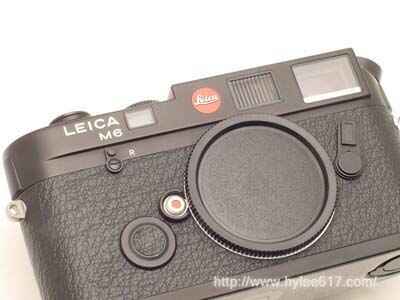
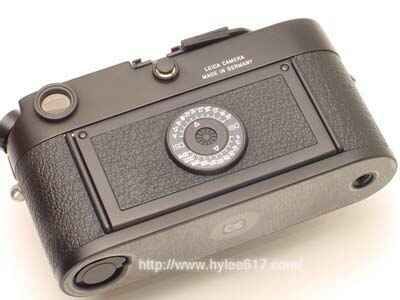
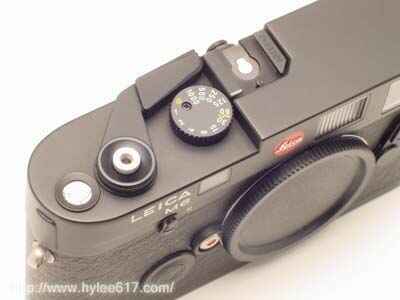
Leica M6 0.85
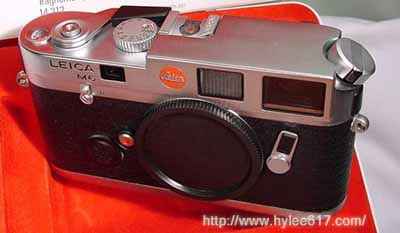
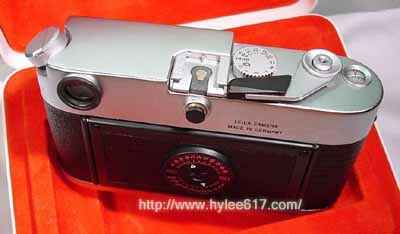
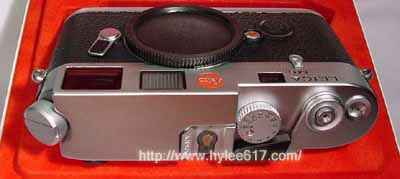
Leica M6 0.72
-
The M6 is the latest, and current model of M series camera. It is based on the M4-P, and retains styling dating back to the first M camera, the M3. It has a silicon diode meter cell that reads off of the shutter curtain. The battery door on the front is the only major difference I appearance between the M6 and it's predecessor, the M4-P.
-
Initally only available in black chrome, in 1986 a silver version became available. The camera division of Leitz was sold to the Wilde Co., and the Leitz name was replaced by "Leica".
Quite a number of limited edition of the M6 have been introduced, making it the Franklin Mint of cameras. These include, but are not limited to 1492-1992 Columbo, Year of the Rooster, M6 Titanium, M6 Platinum, M6J, M6H, and Leica Historical Society edition.
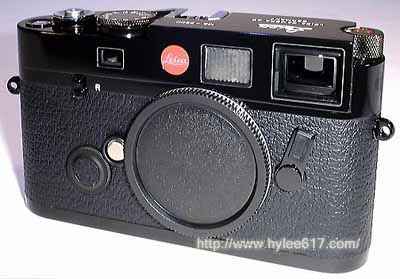
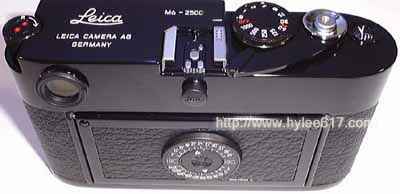
Leica M6TTL
-
The Leica M6 is the current model M series from Leica. A great camera with LED metering that is easy to use. A .85 viewfinder model is also available that omits the framelines for the 28mm lens, but has a higher magnification for our eyesight impaired users. Some say this lends itself to more accurate focusing. I have used both, and in practice I can focus both very accurately with a 50mm F1 Noctilux at F1, so it makes no difference to me. Personally I believe that the framelines for the 28mm outweigh the advantages of the higher magnification viewfinder of the .85. If you have a lot of money, just get both and be done with it. The M6 is also now available in a .58 viewfinder version.
Technical Information
- Number made 1,657251 - Current Production (1984 - Present)
- Finish Black or Chrome or Titanium
- Lens Bayonet Mount
- Shutter Focal Plane
- Film Advance Single Stroke Lever
- Rangefinder/Viewfinder Coupled
Frames 28,35,50,75,90,135
(.85 model Omits 28) (.58 model Omits 135)
- Rangefinder Baselength 49.9mm
- Viewfinder Magnification .72 or .85 or .58
- Field Selector Lever
- Shutter Speeds 1,B,1/1000
- Flash Sync 1/50
- Exposure Meter TTL Silicon Photo Diode
- Film Speed 6-6400 ISO
- No Self Timer
- Weight 560g
|
Variations/Special Models
- Year: 1989
Model: M6 Platinum
Produced: 1250
- Year: 1992
Model: M6 Columbus
Produced: 200
- Year: 1993
Model: M6 Royal Foto
Produced: 101
- Year: 1994
Model: M6 Jubilee
Produced: 1640
- Year: 1995
Model: M6 Dragon
Produced: 300
- Year: 1995
Model: M6 Historica
Produced: 150
- Year: 1995
Model: M6 Danish Royal Wedding
Produced: 200
- Year: 1996
Model: M6 Golden Thailand
Produced: 700
- Year: 1996
Model: M6 Anton Bruckner
Produced: 200
- Year: 1996
Model: M6 Aktion
Produced: 500
- Year: 1996
Model: M6 Ein Stuck
Produced: 996
- Year: 1998
Model: M6 Jaguar XK50
Produced: 996
- Year: 1999
Model: M6 150 Jahre Optik
Produced: 150
- Year: 2000
Model: M6 Millenium
Produced: 2000
- Year: 2000
Model: M6 LHSA .72
Produced: 300 1st Batch #1200 Total
- Year: 2000
Model: M6 LHSA .85
Produced: Unknown Production figures, but definately more than the .72
- Year: 2001
Model: M6 Titanium TTL Limited
Produced: 1000
|
|

















